新目标英语八年级上各单元教案单元重点及练习
人教新目标英语八年级上册unit-4全单元教案
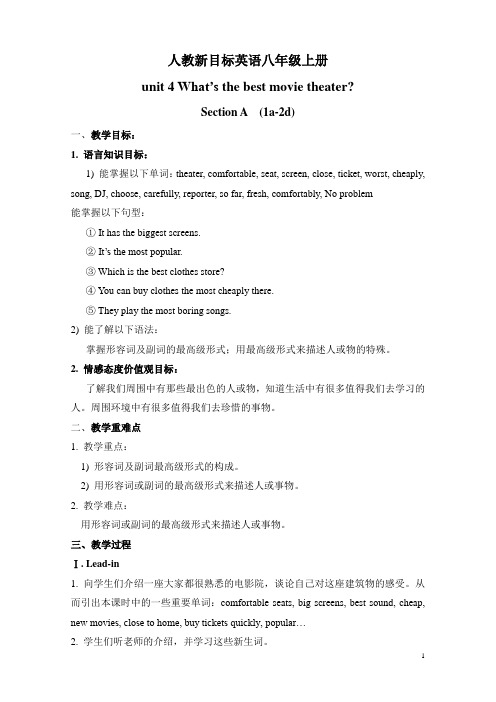
人教新目标英语八年级上册unit 4 What’s the best movie theater?Section A (1a-2d)一、教学目标:1. 语言知识目标:1) 能掌握以下单词:theater, comfortable, seat, screen, close, ticket, worst, cheaply, song, DJ, choose, carefully, reporter, so far, fresh, comfortably, No problem能掌握以下句型:① It has the biggest screens.②It’s the most popular.③ Which is the best clothes store?④ You can buy clothes the most cheaply there.⑤ They play the most boring songs.2) 能了解以下语法:掌握形容词及副词的最高级形式;用最高级形式来描述人或物的特殊。
2. 情感态度价值观目标:了解我们周围中有那些最出色的人或物,知道生活中有很多值得我们去学习的人。
周围环境中有很多值得我们去珍惜的事物。
二、教学重难点1. 教学重点:1) 形容词及副词最高级形式的构成。
2) 用形容词或副词的最高级形式来描述人或事物。
2. 教学难点:用形容词或副词的最高级形式来描述人或事物。
三、教学过程Ⅰ. Lead-in1. 向学生们介绍一座大家都很熟悉的电影院,谈论自己对这座建筑物的感受。
从而引出本课时中的一些重要单词:comfortable seats, big screens, best sound, cheap, new movies, close to home, buy tickets quickly, popular…2. 学生们听老师的介绍,并学习这些新生词。
3. 学生们看幻灯片,并学习记忆这些生词。
新版人教版新目标英语八年级上册全册教案
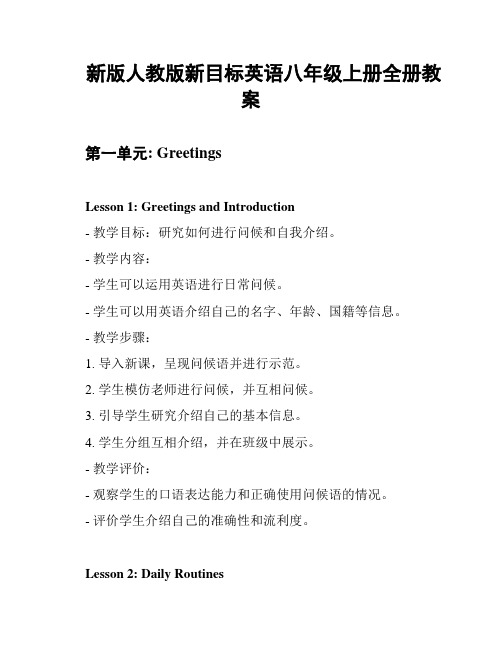
新版人教版新目标英语八年级上册全册教案第一单元: GreetingsLesson 1: Greetings and Introduction- 教学目标:研究如何进行问候和自我介绍。
- 教学内容:- 学生可以运用英语进行日常问候。
- 学生可以用英语介绍自己的名字、年龄、国籍等信息。
- 教学步骤:1. 导入新课,呈现问候语并进行示范。
2. 学生模仿老师进行问候,并互相问候。
3. 引导学生研究介绍自己的基本信息。
4. 学生分组互相介绍,并在班级中展示。
- 教学评价:- 观察学生的口语表达能力和正确使用问候语的情况。
- 评价学生介绍自己的准确性和流利度。
Lesson 2: Daily Routines- 教学目标:研究描述日常活动。
- 教学内容:- 学生能够运用英语描述自己的日常活动。
- 学生可以用英语叙述一天的活动安排。
- 教学步骤:1. 复前一课的内容,引导学生回忆日常活动的英语表达。
2. 引导学生研究新的日常活动的词汇和句型。
3. 学生分组分享自己的一天活动安排,并向全班汇报。
- 教学评价:- 观察学生对日常活动词汇和句型的掌握程度。
- 评价学生的口语表达和沟通能力。
第二单元: Hobbies and Leisure ActivitiesLesson 1: Hobbies- 教学目标:研究谈论自己的兴趣爱好。
- 教学内容:- 学生可以用英语描述自己的兴趣爱好。
- 学生可以运用所学词汇进行对话练。
- 教学步骤:1. 复前一课的词汇和句型。
2. 引导学生研究新的兴趣爱好词汇。
3. 学生分组进行对话练,谈论自己的兴趣爱好。
- 教学评价:- 观察学生对兴趣爱好词汇的掌握情况。
- 评价学生在对话练中的口语表达能力。
Lesson 2: Leisure Activities- 教学目标:研究谈论闲暇活动。
- 教学内容:- 学生能够用英语描述自己的闲暇活动。
- 学生能够与他人交流关于闲暇活动的话题。
- 教学步骤:1. 复前一课的词汇和句型。
最新人教版新目标八年级英语上册1-5单元知识点及练习题

最新人教版新目标八年级英语上册1-5单元知识点及练习题新目标八年级英语上册第一单元Unit 1.How often do you exercise?I. 重点短语归纳:on weekends 在周末go to the movies 去看电影look after=take care of 照顾 surf the internet 上网healthy lifestyle 健康的生活方式go skateboarding 去滑滑板watch TV看电视do some reading 阅读keep healthy=stay healthy = keep in good health 保持健康keep + 形容词表保持某种状态exercise= take/do (much) exercise=do sports锻炼eating habits 饮食习惯take more exercise 做更多的运动the same as 与什么相同once a month一月一次be different from 不同three times a week一周三次twice a week一周两次most of the students=most students 大多数学生shop=go shopping=do some shoppin g 购物make a difference to 对什么有影响As teachers, you must believe that you can make a difference to the lives of your students. 身为教师,你们必须坚信你们能够影响学生的一生。
A false step will make a great difference to my future. 错走一步对我的前程来说会产生很大影响。
how many times 多少次,用来提问做某事的次数although=though虽然 <不能与but连用> Although he is old, he is quite strong.(He is old, but he is quite strong.) 句子中,有although或though就不可再用but,但可用yet或still“仍然,还”;有because就不能再用so. as for至于activity survey活动调查do homework做家庭作业do house work做家务事eat less meat 吃更少的肉junk food垃圾食物be good for 对什么有益be bad for 对什么有害want to do sth 想做某事want sb to do sth想某人做某事try to do sth 尽量做某事come home from school放学回家ofcourse=certainly=sure当然get good grades取得好成绩 help sb to do sth帮助某人做某事=help sb with sth your favorite program 你最喜欢的节目a lot of vegetables=many vegetables许多蔬菜hardly= almost not几乎不hardly ever很少,几乎不,从不some advice 一些建议some advice 中的advice 是不可数名词 a piece of advice 一则建议give advice 提出建议takeone’s advice 采纳或听从某人的建议keep/be in good health保持健康Animal World 动物世界play soccer踢足球once or twice a week 每周一两次three or four times a week 每周三四次at Green High School 在格林高中all students 所有的学生most students 大多数学生some students 一些学生no students 没有学生the result of a survey 调查结果the result for “watch TV”“看电视”的调查结果improve your English 提高你的英语drink milk 喝牛奶pretty healthy 相当健康 pretty adv. 相当,非常Pretty(用作副词时) =rather=very=quite 非常,相当kind of = a little 有点I think I’m kind of unhealthy. 我想我有点不健康。
最新人教版新目标英语八年级上全册教案教学文案
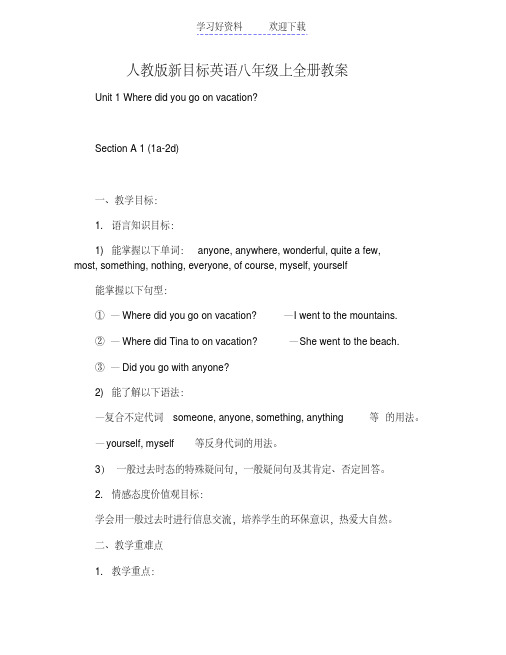
人教版新目标英语八年级上全册教案Unit 1 Where did you go on vacation?Section A 1 (1a-2d)一、教学目标:1. 语言知识目标:1) 能掌握以下单词:anyone, anywhere, wonderful, quite a few,most, something, nothing, everyone, of course, myself, yourself能掌握以下句型:①—Where did you go on vacation? —I went to the mountains.②—Where did Tina to on vacation? —She went to the beach.③—Did you go with anyone?2) 能了解以下语法:—复合不定代词someone, anyone, something, anything等的用法。
—yourself, myself等反身代词的用法。
3)一般过去时态的特殊疑问句,一般疑问句及其肯定、否定回答。
2. 情感态度价值观目标:学会用一般过去时进行信息交流,培养学生的环保意识,热爱大自然。
二、教学重难点1. 教学重点:1) 用所学的功能语言交流假期去了什么旅行。
2) 掌握本课时出现的新词汇。
2. 教学难点:1) 复合不定代词someone, anyone, something, anything等的用法。
2) yourself, myself等反身代词的用法。
三、教学过程Ⅰ. Lead-in1. 看动画片来进入本课时的主题谈论上周末做了些什么事情,谈论过去发生的事情。
Ⅱ. Presentation—Yes, I did./No, I didn’t. - 1 -1. Show some pictures on the big screen. Let Ss read the expressions.2. Focus attention on the picture. Ask: What can you see? Say:Each picture showssomething a person did in the past. Name each activity and ask students to repeat:Stayed at home, Went to mountains, went to New York City 6.Went to the beach,visited my uncle, visited museums, went to summer camp3. Now, please match each phrase with one of the pictures nextto the name of theactivity,point to the sample answer.4. Check the answers. Answers: 1. f 2. b 3. g 4. e5. c6. a7.dIII. Listening1. Point to the picture on the screen.Say: Look at the picture A. Where did Tina go on vacation? She went to mountains.Ask: What did the person do in each picture?2. Play the recording the first time.3. Play the recording a second time.Say: There are three conversations. The people talk about what did on vacation. Listen to the recording and write numbers of the names in the right boxes of the picture.4. Check the answers.IV.Pair work1. Point out the sample conversation. Ask two Ss to read the conversation to the class.2. Now work with a partner. Make your own conversation about the people in the picture.3. Ss work in pairs. As they talk, move around the classroom and give any help they need.4. Let some pairs act out their conversations.V. Listening1. Tell Ss they will hear a conversation about threestudents’ conversatio ns. Listen for the first time and fill inthe chart. Then listen again and check Yes, or No.2. Let Ss read the phrases in the chart of 2b.3. Play the recording the first time. Ss listen and fill inthe chart.4. Play the recording a second time for the Ss to check ―Yes,I did.‖ or ―No, I didn’t. ‖5. Check the answers with the Ss.VI. Pair work- 2 -1. Let two Ss read the conversation between Grace, Kevin andJulie.2. Let Ss work in pairs and try to role-play the conversation.3. Ask some pairs to act out their conversations.VII. Role-play1. First let Ss read the conversation and match the people andplaces they went.2. Let Ss act out the conversations in pairs.3. Some explanations in 2d.Homework:用英语询问你的一位好朋友,她(他)假期去了哪里?看到了什么?并将此对话写在作业上。
新目标英语八年级(上)Unit3重点归纳与基础知识一体化练习

新目标英语八年级(上)Unit3重点归纳与基础知识一体化练习新目标英语八年级(上)Uni3重点归纳与基础知识一体化练习一、单元要点归纳1. care(形容词) ; (副词)2.true(副词) ; (名词)3.loud(副词) ;4talent (形容词) 5.quiet (副词)6win (名词) 7say; (名词)8.clear (副词)二、本单元重点(句型)(1)have fun doing sth(2) as+形容词或副词+ asThe boy is as (heath) as his father.3 be good at doing sth.4 make sb. do sth. 4. It’s + (形容词) for sb to do sth二、单元语法形容词比较级大多数的形容词都有三个级别:原级、比较级、最高级。
其中比较级表示“更……”,用于两者之间的比较,用来说明“前者比后者更……”,比较级前面一般用much, even, a little修饰,其中even, much 只能修饰比较级。
规则变化:①单音节和部分双音节的形容词一般在词尾加-erEg: calm—calmer tall—taller smart—smarter②以字母e结尾的直接在词尾加-rEg: nice—nicer fine—finer large—larger③以“辅音+y 结尾的词,变y为i,再加-er”Eg: early—earlier happy—happier busy—busier④以重读闭音节的单个辅音字母结尾的词,双写辅音字母,再加-erEg: big—bigger thin—thinner hot—hotter⑤多音节或部分双音节的形容词在原级前面加moreEg: popular—more popular important—more important 不规则变化:少数形容词的比较级变化是不规则的:1. good---better2. bad/ill---worse3. many/much---more4. little---less5. far---farther/further三.单元重点词组1. 更外向2. 唱歌比赛3. 类似的 1.4. 交朋友5. .be good at6.be the same as7.be different from8.enjoy/stop doing sth9.more /less than…10.most of11.in some way 12.two years ago13.look different / the same四.写出下列词的比较级1.quiet________2.smart_______3.funny______4.thin_______5.outgoing_____6.heavy______7.serious_______8.long_______9.short______ 10.tall_______五.写出下列词的反义词1.big__________2.short__________3.easy___________4.white________________5.happy________6.good__________7.cool____________8.expensive_______________9.old___________ 10.hot ___________六. 用所给词的正确形式填空1 .Han Hong is _____________(heavy) than Zhang Ziyi. Zhang Ziyi is _________(thin) than Han Hong.2 .Li Yong is _____________________(outgoing) of the two boys.3.My car is4.5m , his car is 5m, so My car is _________than his car..(long)4 .Tom is much _________ than Sam. ( cool )5. My hair is a little _________ than hers. ( short )6. Pedro is ____________ than Paul. ( funny )7. Li Ping’s hair is a little longer than _______________(I ) .8. Which is _______________ in China, tea or coffee? ( popular)9. Tina is much __________________ than Tara. (tall )七. 选择1. Jim’s bag is _________ than Kate’s.A. biggerB. bigC. biggestD. biger2. My shoes are cheaper than ________.A. youC. yoursD. your one3. The man in the blue shirt is than the man in the white shirt.A. funnyB. much funnyC. funnierD. more funnier4 Liven is ________ than I am.A. funny and outgoingB. more funnier and outgoingC. funnier and more outgoingD. more funny and outgoing5. Tina is ________ better at physics than Tara.A.moreB.muchC.veryD. a lot of6 I am good at____ , But Li Lei is good at ___A. Chinese, play computersB. Chinese, to play computersC. Chinese, playing computersD. China, play computers7. My brother is ________ more outgoing than me.A. moreB. mostC. a littleD. little8. I ________a primary school student two years ago.A. wasC. beD. were9. Here are photos of ________twin sister and .A. me, IB. my, meC. me, myD. I, me10. My friend is ________as me. We are both quiet.A. as sameB. so sameC. the sameD. not the same as11. She likes singing, dancing and talking with others. But I often stay at home and read books. So I am ______than her.A. funnierB. quieterC. more outgoingD. wilder12. My father never eats junk food, and he exercises every day. So he is ______ .A. unhealthyB. healthyC. seriousD. smart13. Liu Ying is not __ good at sports __ her sister.A. much, thanB. a littleC. as, soD. so, as14.My book is cheaper than ____________,A. yourB. herC.hisD. me15. ______he is a beginner, ______he speaks English very well.A. Although , butB. Although , /C. /, although D .But, /16. My family ______TV when I was young.A. did n’t haveB. had noC. don’t haveD. A or B17. _____is it from your home to the store? __ 30 kilometersA. How longB. How farC. How soonD. How often18 The Yellow River is _____ the Changjiang River.A. longer thanB. as long asC. not so long asD. not long as19. Mother often says Tom is _____ careful than me.A. muchB.moreC.soD. as20. Who is _____ swimming, you or she?A. better aB. better atC. good atD. good in21.I think _____ to me.A. you’re listenB. you not listeningC. he is listenningD. he is listening22. ---How do usually come to school?---___ bus.A. ByB. InC. WithD. For四:阅读理解The sun says he is stronger than the wind. The wind says he is stronger than the sun.A man is walking down the street with a hat and coat on.The sun says, “Let’s see who can make the man tak e off his hat and coat. If you can do that, you are stronger than me.”Now the wind begins to blow(吹). But the harder he blows the tighter(更紧地)the man holds his hat and coat. The wind can’t make the man tak e off his hat and coat.Now the sun tries. He shines(照耀)brightly. Soon the man takes off his hat. Then the sun shines more brightly, and the man takes off his coat.So the wind says, “That’s all. You are stronger than me.”根据内容判断正误,对的填(T)错的填(F)( ) 51. The wind is stronger than the sun.( ) 52. The sun says he can make the man take off the hat and coat.( ) 53. The harder the wind blows, the tighter the man holds his hat and coat.( )54. The sun begins to shine brightly, and the man takes off his hat and coat.( )55. The sun and the wind can’t make the man take off his hat and coat.八、书面表达write two paragraphs describing your friends.(写两段话描述你的朋友)。
新目标八年级英语上册全册教案
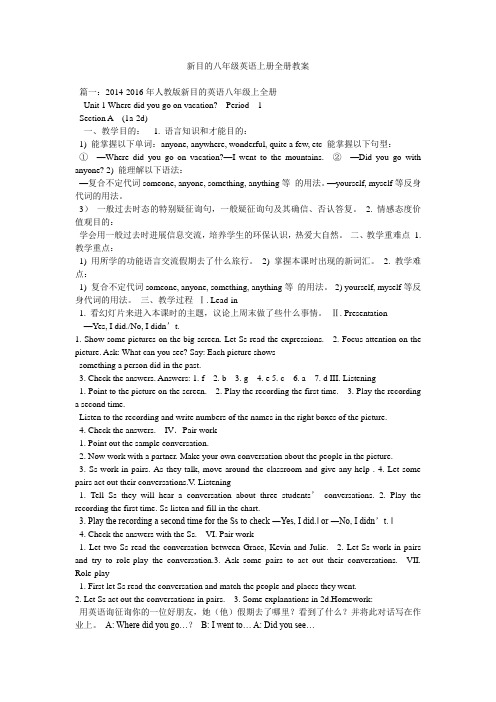
新目的八年级英语上册全册教案篇一:2014-2016年人教版新目的英语八年级上全册Unit 1 Where did you go on vacation? Period 1Section A (1a-2d)一、教学目的: 1. 语言知识和才能目的:1) 能掌握以下单词:anyone, anywhere, wonderful, quite a few, etc 能掌握以下句型:①—Where did you go on vacation?—I went to the mountains. ②—Did you go with anyone? 2) 能理解以下语法:—复合不定代词someone, anyone, something, anything等的用法。
—yourself, myself等反身代词的用法。
3)一般过去时态的特别疑征询句,一般疑征询句及其确信、否认答复。
2. 情感态度价值观目的:学会用一般过去时进展信息交流,培养学生的环保认识,热爱大自然。
二、教学重难点1. 教学重点:1) 用所学的功能语言交流假期去了什么旅行。
2) 掌握本课时出现的新词汇。
2. 教学难点:1) 复合不定代词someone, anyone, something, anything等的用法。
2) yourself, myself等反身代词的用法。
三、教学过程Ⅰ. Lead-in1. 看幻灯片来进入本课时的主题,议论上周末做了些什么事情。
Ⅱ. Presentation —Yes, I did./No, I didn’t.1. Show some pictures on the big screen. Let Ss read the expressions.2. Focus attention on the picture. Ask: What can you see? Say: Each picture showssomething a person did in the past.3. Check the answers. Answers: 1. f 2. b 3. g4. e5. c6. a7. d III. Listening1. Point to the picture on the screen.2. Play the recording the first time.3. Play the recordinga second time.Listen to the recording and write numbers of the names in the right boxes of the picture.4. Check the answers. IV.Pair work1. Point out the sample conversation.2. Now work with a partner. Make your own conversation about the people in the picture.3. Ss work in pairs. As they talk, move around the classroom and give any help .4. Let some pairs act out their conversations.V. Listening1. Tell Ss they will hear a conversation about three students’conversations.2. Play the recording the first time. Ss listen and fill in the chart.3. Play the recording a second time for the Ss to check ―Yes, I did.‖ or ―No, I didn’t. ‖4. Check the answers with the Ss. VI. Pair work1. Let two Ss read the conversation between Grace, Kevin and Julie.2. Let Ss work in pairs and try to role-play the conversation.3. Ask some pairs to act out their conversations. VII. Role-play1. First let Ss read the conversation and match the people and places they went.2. Let Ss act out the conversations in pairs.3. Some explanations in 2d.Homework:用英语询征询你的一位好朋友,她(他)假期去了哪里?看到了什么?并将此对话写在作业上。
人教新目标英语八年级上册unit1-Unit4单元重点知识复习
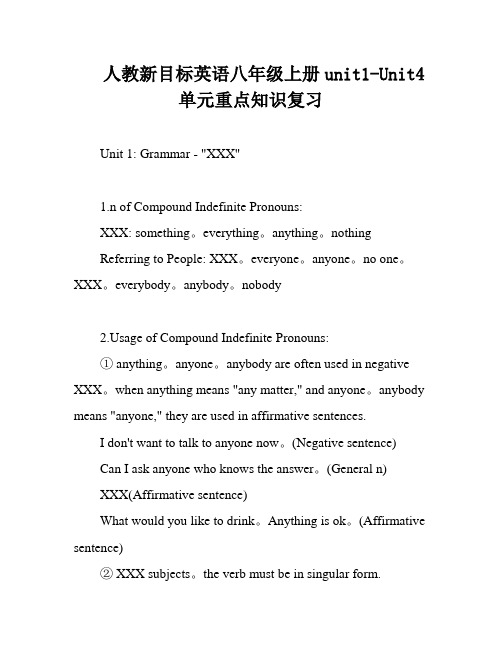
人教新目标英语八年级上册unit1-Unit4单元重点知识复习Unit 1: Grammar - "XXX"1.n of Compound Indefinite Pronouns:XXX: something。
everything。
anything。
nothingReferring to People: XXX。
everyone。
anyone。
no one。
XXX。
everybody。
anybody。
nobodyage of Compound Indefinite Pronouns:① anything。
anyone。
anybody are often used in negative XXX。
when anything means "any matter," and anyone。
anybody means "anyone," they are used in affirmative sentences.I don't want to talk to anyone now。
(Negative sentence)Can I ask anyone who knows the answer。
(General n)XXX(Affirmative sentence)What would you like to drink。
Anything is ok。
(Affirmative sentence)② XXX subjects。
the verb must be in singular form.Everyone here is from China.XXX.③ Adjectives XXX.Would you like to buy anything special?Can XXX interesting?④ When making requests。
人教新目标版八年级英语上册全书重点知识整理及练习

人教新目标版八年级英语上册全书重点知识整理及练习一、学习目标:知识目标:掌握本讲涉及的单词、短语和句型。
情感目标:帮助同学们在假期中复习基础知识,查漏补缺,使同学们的知识水平达到一个新的高度。
二、重点、难点:重点:八年级上册的重点单词、短语。
难点:八年级上册的重点句型。
三、知能提升:(一)重点单词[单词复习]1. exercise (v & n) 锻炼;运动;练习2. try (v) 试图;设法;努力3. help (v & n) 帮助4. although/though (conj) 虽然;即使;纵然5. keep (v) 保持;使……保持(某种状态)6. foot (n) 脚7. tooth (n) 牙齿8. advice (n) 劝告;忠告;建议9. until (conj) 直到……之时;在……之前10. famous (adj) 著名的;出名的11. leave (v) 离开;出发12. forget (v) 忘记13. finish (v) 结束;完成14. take (v) 花费;带走15. both (pron) 两个(都);两者(都)16. however (adv) 然而17. interest (n) 兴趣;爱好18. beat (v) 打败;战胜19. information (n) 消息;信息20. win (v) 赢;获胜21. luckily (adv) 幸运地22. hold (v) 举行23. over (prep) (在数目、数值、程度等方面)超过;在……以上24. hate (v) 憎恨;憎恶25. borrow (v) 借;借入;借用26. invite (v) 邀请27. success (n) 成功28. without (prep) 无;没有29. enough (adj & adv) 充足的(地);足够的(地)30. should(modal v)应该[即学即练]1. I e every day. It is good for my health.2. It’s good for everyone to take a lot of (exercise).3. A he is young, he knows a lot of things.4. He usually goes to school on f .5. I don’t like the bad weather. I h rain.6. I didn’t take my pen. Can I b yours?7. My mother gets angry when I f to clean my room.8. I don’t have e money to buy such an expensive CD player.9. Fish can’t live w water.10. We (尽力) to eat a lot of vegetables to keep healthy.11. It’s a good habit to brush your (牙齿) twice a day .12. The Great Wall is (著名的) in the world .13. This is an old shop. (但是) , there are still many people in it .14. People can get lots of (信息) from the Internet .15. We have the same (爱好). We both like sports and music.16. My father always (打败) me in chess .17. Our school is going to __________ (举行) a sports meeting this autumn .18. Could you please (借) me some money ?19. We finished the plan and got a great____________(成功) .20. I (邀请) all my friends to my birthday party last Sunday .21. We (win)the basketball match yesterday. That’s really an exciting match.22. He is (leave) for Beijing next week.23. When you finish (take) photos, please show them to me.24. How long does it take you (walk ) to school ?25. You should (drink) lots of water when you have a fever.26. (luck), we found our lost dog.27. We must keep in the reading room.A. quietB. quietlyC. quiteD. quitely28. Let’s go to the teacher for .A. a adviceB. an adviceC. some adviceD. some advices29. Li Lei’s parents playing baseball.A. all likeB. like allC. both likeD. like both30. Don’t forget the lights when you leave the classroom.A. turn offB. turning offC. to turn offD. to turn on31. I didn’t go to bed my parents came back.A. untilB. afterC. atD. while32. There are over forty students in our class. (选出与划线单词同义的短语)A. less thanB. more thanC. nearlyD. about33. My healthy lifestyle helps me _______ good grades.A. getB. gettingC. gotD. geting34. He didn’t run ______ , so he fell behind .A. fast enoughB. enough fastC. slow enoughD. enough slow(二)重点短语[短语复习]1. as for至于;关于2. be good for 对……有益3. be good at擅长;在……方面(学得,做得)好4. look after 照看;照顾5. be different from和……不同6. the same as 和……一样7. too much太多8. something different一些不同的(东西)9. at the moment 此时;现在10. depend on视……而定;取决于11. come over顺便来访12. turn on打开13. have fun doing sth. 做某事有乐趣14. too…to…太……以至于不能……15. at the age of在……岁时16. take part in参加17. because of因为;由于18. grow up成长;长大19. all over到处;遍及各处20. work on从事;忙于[即学即练]1. 至于这个问题,不要管它。
八年级上册英语1-5单元重难点知识精讲精练(人教新目标)
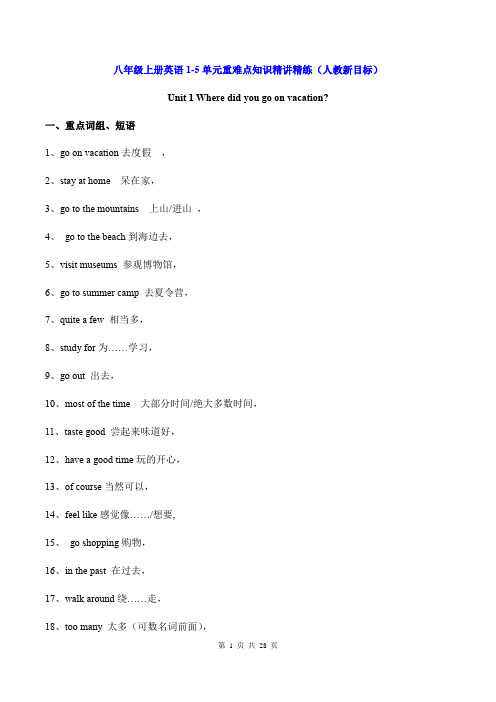
八年级上册英语1-5单元重难点知识精讲精练(人教新目标)Unit 1 Where did you go on vacation?一、重点词组、短语1、go on vacation去度假,2、stay at home 呆在家,3、go to the mountains 上山/进山,4、go to the beach到海边去,5、visit museums 参观博物馆,6、go to summer camp 去夏令营,7、quite a few 相当多,8、study for为……学习,9、go out 出去,10、most of the time 大部分时间/绝大多数时间,11、taste good 尝起来味道好,12、have a good time玩的开心,13、of course当然可以,14、feel like感觉像……/想要,15、go shopping购物,16、in the past 在过去,17、walk around绕……走,18、too many 太多(可数名词前面),19、because of 因为,20、one bowl of 一碗……,21、find out 查出来/发现,22、go on继续,23、take photos 照相,24、something important重要的事情,25、up and down上上下下,26、come up出来二、重要句子(Grammar focus):1.-Where did you go on vacation?你到哪里去度假了?-I went to New York City.我去了纽约城2.-Did you go out with anyone? 你出去带人吗?-No, No one was here. Everyone was on vacation.不,没有人在这儿.大家都去度假了.3.-Did you buy anything special?你买了什么特别的东西吗?-Yes, I bought something for my father.对,我给父亲买了一些东西.4.-How was the food? 食物怎么样?- Everything tasted really good.每一样东西真的都好吃.5.-Did everyone have a good time?大家玩的开心吗?-Oh, yes. Everything was excellent.对,一切都很精彩.三、习惯用法、搭配1. buy sth. for ab./ buy sb. sth. 为某人买某物2. taste + adj. 尝起来……3. nothing ….but + V.(原形) 除了……之外什么都没有4. seem + (to be) + adj 看起来5. arrive in + 大地方/ arrive at + 小地方到达某地6. decide to do sth. 决定做某事7. try doing sth. 尝试做某事/ try to do sth. 尽力做某事8. enjoy doing sth. 喜欢做某事9. want to do sth. 想去做某事10. start doing sth. 开始做某事11. stop doing sth. 停止做某事12. look + adj 看起来13. dislike doing sth. 不喜欢做某事14. Why not do sth. 为什么不做…….呢?15. so + adj + that + 从句如此……以至于……16. tell sb. (not) to do sth. 告诉某人(不要)做某事17. keep doing sth. 继续做某事18. forget to do sth. 忘记去做某事/ forget doing sth 忘记做过某事四、词语辨析Section A1.Where did you go on vacation? 你去哪里度假了?(P1)1)这是有疑问副词where引导的特殊疑问句,where用来询问地点和场所,放在句首.a._____ do you _____ ______?你从哪里来?b._____does he______?他住在哪里?2)go on vacation意为“去度假”.I want ____ ____ ____ ____in Hainan this winter.今年冬天我想去海南度假.2.visited my uncle 看望了我的叔叔(P1)visit是及物动词,意为“拜访;探望”,后接表示人的名词或代词.visit还可以意为“参观;游览”,后接表示地点的名词.a.I visited my grandmother last week. 上周我去______了我的外婆.b.Do you want to visit Shanghai? 你想______上海吗?拓展:visitor意为“参观者;游客”.eg: These visitors come from America._______________________3.buy anything special 买特别的东西.(P2)1)buy及物动词,意为“买;购买”.其过去式为______.拓展:buy sth. for sb.=buy sb. sth. 意为“给某人买某物”.My uncle_____ _____a bike.= My uncle_____ _____for me.2)anything不定代词,意为“某事;某件东西”,主要用于疑问句或否定句中.a.Do you want anything from me?b.I can’t say anything about it.3) anthing special表示“特别的东西”,形容词修饰不定代词时后置.Is there________ ________in this book?这本书里有新的内容吗?4.Oh, did you go anywhere interesting?哦,你去有趣的地方了吗?(P2)1)本句是did开头的一般疑问句2)anywhere用作副词,意为“在任何地方”.eg:Did you go anywhere during the summer vacation?辨析:anywhere与somewhereanywhere意为“在任何地方”,常用于否定句和疑问句中. eg:I can’t find it anywhere.somewhere意为“在某处;到某处”,常用于肯定句中. eg:I lost my key somewhere near here.5.We took quite a few photos there.我们在那里拍了不少照片.(P2)take photos 意为“照相;拍照”. eg:We______ ______on the Great Wall.我们在长城上照了相.辨析:quite a few与quite a littlequite a few 意为“很多;不少”,修饰可数名词复数;quite a little 意为“很多;不少”,修饰不可数名词.a. He stays here for _____ _____ _____days.b.There is _____ _____ _____water in the bottle(瓶子).6. I just stayed at home most of the time to read and relax. 我大部分时间只是待在家里读书休息. (P2)most of the time意为“大部分时间”,其中most为代词,意为“大部分;大多数”.拓展most of…意为“……中的大多数”,它作主语时,谓语动词取决于most of后所修饰的名词.a. Most of us_____(be)going to the park. 我们大多数人要去公园.b. Most of the food_____(go)bad. 大部分的食物都变质了.7.Everything tasted really good!所有的东西尝起来真的很好吃!(P3)taste在此为系动词,意为“尝起来”,其后接形容词构成系表结构.a.The food tastes really great.食物尝起来棒极了.8. Did everyone have a good time?大家都玩得很开心吗?(P3)have a good time = enjoy oneself = have fun 玩得开心(+ doing)eg: We had a good time visiting the the Great Wall.= We enjoyed ourselves visiting the the Great Wall.= We had fun visiting the the Great Wall.9.How did you like it? 你觉得它怎么样?(P3)How do/did you like……? 意为“你觉得……怎么样?”,用来询问对方的观点或看法,相当于What do you think of……?eg: How do you like your new job? = _____ _____ _____ _____ your new job?10.Did you go shopping? 你们去购物了吗?(P3)go shopping意为“去购物;去买东西”,同义短语为do some shopping.eg: I usually go shopping on Sundays.我通常星期天去购物.拓展:“go+doing”形式表示“去做某事”,常用于表达从事某一体育活动或休闲活动.go skating 去滑冰go hiking 去go sightseeing 去观光go fishing 去钓鱼go swimming 去游泳go boating 去划船11.I went to a friend’s farm in the countryside with my family.我和家人一起去了乡下一个朋友的农场.(P3)a friend’s farm是名词所有格形式.一般情况下,表示“有生命的人或物”的名词后面加’s,表示所属关系.eg:The red bike is Alice’s. 那辆红色的自行车是爱丽斯的.拓展:名词所有格的构成:1)单数名词词尾加’s ,复数名词词尾没有s,也要加’sthe girl ‘s pen女孩的钢笔women’s shoes女鞋on Children’s Day2)复数名词以s结尾的只加’the students’ reading room学生阅览室Teachers’ Day教师节3)如果两个名词并列,并且分别有’s,则表示“分别有”;只后一个名词有一个’s,则表示“共有”:John’s and Kate’s rooms.约翰和凯特(各自)的房间.Lily and Lucy’s father. 莉莉和露西的爸爸(同一个爸爸).4)表示无生命的名词一般以...of...构成短语,表示所有关系.a map of China一幅中国地图the name of the story那个故事的名字12. Still no one seemed to be bored. (即使这样)仍然没有人看起来无聊.(P3)1)seem意为“好像;似乎;看来”.eg:Everything seem s easy.一切似乎很容易.拓展a. seem+adj. “看起来……”. You seem happy today.你今天看起来很高兴.b. seem+to do sth. “似乎,好像做某事”. I seem to have a cold.我似乎感冒了.c. It seems/seemed+从句“看起来好像…;似乎…”.It seems that no one believes you.看起来好像没有人相信你.2)辨析:bored与boringa. bored意为“厌烦的;感到无聊的”,一般在句中修饰人.b. boring意为“无聊的;令人厌烦的”,一般在句中修饰事或物.eg:a. I’m ______with what he said.我对他说的话厌烦极了.b. I find the story very_______.我发现这个故事太无聊了.Section B1. What activities do you find enjoyable? 你发现什么活动让人快乐?(P5)1)activities是activity的复数形式,意为“活动”.Students like outdoor activities. ____________________________2)enjoyable形容词,意为“愉快的;快乐的”.I’m sure we will have an enjoyable vacation. 我确信我们将会有一个愉快的假期.2. I arrived in Penang in Malaysia this morning with my family. 今天早上我和家人到达了马来西亚的槟城.(P5arrive不及物动词,意为“到达”.arrive in表示到达较大的地方,如国家、省、市等;arrive at 表示到达较小的地方,如机场、商店、广场、村庄等.(注:地点副词home,here,there前介词省略)辨析:①arrive in+大地点/ arrive at+小地点②get to +地点③reach+地点eg:I (到达) school at 8:00 o’clock yesterday.3. …so we decided to go to the beach near our hotel…因此我们决定到旅馆附近的海滩上去.(P5)decide to do sth.意为“决定做某事”. eg: They _____ ______ ______the museum.他们决定去参观博物馆.拓展:decide后常跟“疑问词+动词不定式”做宾语.He can’t decide when ______ _____(leave) 他不能决定何时动身.4. My sister and I tried paragliding.姐姐和我尝试了滑翔伞运动.(P5)try此处用作及物动词,其后常接名词、动名词或不定式,意为“尝试;试图,设法;努力”She is trying my bicycle.她正在试骑我的自行车.拓展:try也可用作名词,意为“尝试”,常用短语“have a try”,意为“试一试”.I want to have a try.我想试一试.辨析:try doing sth. / try to do sth.1)try doing sth. 尝试做某事,表示一种尝试、做做看的想法,不一定付出很多努力.2)try to do sth.尽力、设法去做某事,表示想尽一切办法要把事情办成,强调付出努力设法去完成.a. I ______ ______ him, but no one answered. 我试着给他打电话了,但没有人接听.b. I’m ______ ______ ______ English well. 我正尽力把英语学好.5. I felt like I was a bird. It was so exciting! 我感觉自己就像一只小鸟.太刺激了!(P5)1)feel like意为“给……的感觉;感受到”.其后常接从句.eg: He feels like he is swimming. 他感觉像在游泳一样.拓展:feel like还可意为“想要……”,其后可接名词、代词或动名词.即:feel like sth. 想要某物feel like doing sth. 想要做某事eg:Do you feel like a cup of tea now? 你现在想要一杯茶吗?Do you feel like ______ (take) a walk in the park with me? 你想跟我在公园散步吗?2)辨析:exciting与excitedexciting 意为“令人兴奋的,使人激动的”,一般修饰某物.excited 意为“感到兴奋的,激动的”,一般修饰某人.Eg:a.The story is_________(exciting, excited) .b.He told me the_______(exciting, excited)news.c.Sarah was_______(exciting, excited)to see the singer.6. There are a lot of new buildings now…现在有许多新的建筑物……(P5)building 可数名词,意为“建筑物;楼房”.build 动词,“建造,建筑” (built,built),The workers built many tall buildings in our school last year.7. I wonder what life was like here in the past. 我想知道在这儿过去的生活是什么样的.(P5)wonder此处是及物动词,意为“想知道;琢磨”.其后常接who, what, why等疑问词引导的宾语从句.Eg:1.I wonder _______________. 我想知道那个男孩是谁.A. the boy is who B. who the boy is2. I wonder what they were doing here.我想知道他去哪里了.8.I really enjoyed walking around the town. 我真的很喜欢在镇上到处走走. (P5)1)enjoy及物动词,意为“喜爱;欣赏;享受……的乐趣”,其后接名词,代词或动名词作宾语.a. Do you enjoy your job? 你喜欢你的工作吗?b. I enjoy reading books. 我喜欢读书.(enjoy doing sth.喜欢做某事)拓展:enjoy oneself =have a good time = have fun 玩得开心(+ doing sth.)2)walk around 意为“四处走走”.He’s just walking around the village.他只是在村庄里随便走走.9. What a difference a day makes! 一天的变化有多大呀!(P5)difference可数名词,意为“差别,差异” ;其形容词形式为different,意为“不同的;有差异的”. Eg: a. What is the difference between this book and that book?b. My schoolbag is different from yours. ( be different from 意为“与……不同”)10. We wanted to walk up to the top , but then it started raining a little so we decided to take the train.(P5)1)want to do sth. 意为“想要做某事”.2)start doing sth. 意为“开始做某事”,同义短语:start to do sth.Eg: Tom started learning English last year.3)a little 意为“一点儿”,在句中修饰动词、形容词或副词.也可以修饰不可数名词.Eg: a. I can draw a little, but only as a hobby. ______________________________b. It’s a little cold outside. ______________________________c. He can speak a little English. ______________________________4) take the train意为“乘火车”,take在此意为“乘坐”.11.We waited over an hour for the train because there were too many people. 因为人太多,所以我们等了一个多小时的火车.(P5)1)wait for意为“等候”,其后可接人或物.Tom was waiting for a bus over there.2)over介词,意为“多于;超过” ,相当于more than.Eg : My father is over 40 years old.There are over eight hundred students in our school.3) too many意为“太多”,其后接可数名词复数. He always has too many questions to ask me.辨析:too many + 可数名词复数意为“太多... ”too much + 不可数名词意为“太多... ”much too + 形容词意为“太... ”eg:I have homework to do today.12.And because of the bad weather, we couldn’t see anything below.而且因为坏天气,我们也没能看到下面的任何景色(P5)辨析:because of与becausea. because of意为“因为,由于”,后可接名词、代词或动名词,不能接句子.He lost his job because of his age.b. because意为“因为”,引导状语从句,即接句子.I didn’t buy the shirt because it was too expensive.13. My father didn’t bring enough money…我爸爸没带足够的钱……(P5)1)辨析:bring与takebring意为“带来;拿来”,指从别处带到说话者所在地.take意为“拿走;带走”,指从说话者所在地带到别处去.2)enough 意为“足够的,充分的”1.用来修饰形容词或副词,一般置于被修饰词之后.2.用来修饰名词时可放在形容词前面或后面.Eg:a. We have enough time to do our homework.b. The box is big enough.14. …because we forgot to bring an umbrella…因为我们忘了带雨伞.(P6)辨析:forget to do sth.与forget doing sth.forget to do sth. 意为“忘记要做某事(事情还没做)” eg: Don’t forget to close the window. forget doing sth. 意为“忘记做过某事(事情已经做过了)” eg: I forget closing the window. 15. About one hour later, we stopped and drank some tea. 大约一小时后,我们停下来喝了些茶.(P6)1)one hour later 一小时后;一小时前__________________2)stop动词,意为“停止;中断”,过去式_________,现在分词__________;3)drink及物动词,意为“喝;饮”;还可以作名词,意为“饮料”.16. Did you dislike anything? 你不喜欢什么东西吗?(P7)dislike意为“不喜欢;厌恶”,其后可接名词、代词或动名词形式作宾语.Eg:a. Mary ______ the hamburgers. 玛丽不喜欢汉堡包.b. I _____ ______ computer 我不喜欢玩电脑游戏.17. Why not? 为什么不带呀?(P8)why not意为“为什么不呢”,一般用在疑问句中,表示提建议;why not后面需跟动词原形.注“Why not + 动词原形?” 相当于“Why don’t you+ 动词原形?”a. Why not go to the party with me? =Why don’t you go to the party with me?为什么不和我一起去参加聚会呢?b._____ _____ take a walk? = _____ ______ _____ take a walk? 为什么不去散步呢?18.Everyone in our class took a bag with some food and water. 我们班上的每一个人都随身带了装有食物和水的提袋.(P8)with介词,意为“具有;带有”. 此处介词短语with some food and water作bag的后置定语.拓展:with作介词时的其他用法:a.“和……一起’I often go to school ______ my friend. 我经常和朋友们一起去上学.b. 以(手段、材料),用(工具),Cut the apple with a knife. 用刀切苹果.19. My legs were so tired that I wanted to stop. 我的双腿太累了以至于我都想停下来.(P8)so…that… / such…that…(如此…以致)引导的结果状语从句so+adj./adv.+that…Eg:1. He is ____lovely a boy____we love him very much.2. The little boy is so young that he can’t go to school. _________________________________20.常用的感叹句的结构:1)What +adj.+ 复数名词/ 不可数名词+主语+谓语!2)What +a/an+adj.+可数名词单数+主语+谓语!3)How +ad j. +a/an+可数名词单数+主语+谓语!4)How+a dj./adv. +主语+谓语!eg: 1.What an interesting book it is! = How interesting a book is! 那本书多么有趣啊!2.____a clever girl she is! A.Who B.What C.How D.Where3. _____clever a girl she is! A.Who B.What C.How D.Where4._____important jobs they have done! A.What B.Who C.How D.Where5._____sweet water it is! A.Who B.What C.Where D. How6._____interesting the dog is! A.Who B.What C. Where D. How21. My classmates told me to keep going, so I went on. 我的同学告诉我坚持往前走,因此我便继续前进了(P8)1)tell sb. (not)to do sth.意为“告诉某人(不要)做某事.The teacher ______ ______ ______ ______ the window just now. 老师刚才告诉我们擦窗户. 2)keep doing sth. 意为“继续做某事,一直做某事”.She______ ______ TV for two hours last night. 昨晚她持续看了两个小时的电视.23. Everyone jumped up and down in excitement. 大家都兴奋地跳起来.(P8)up and down 意为“上上下下;来来回回”,在句中作状语.Eg:They looked me ______ ______ ______. 他们上上下下打量我.He walks______ ______ ______ in the room. 他在房间里来回走动.22.反身代词:myself , ourselves, yourself , yourselves, himself, herself, itself, themselves.作动词或介词的宾语:经常在enjoy, teach, hurt, buy, introduce, dress, kill等动词和by, for, to, of等介词后作宾语.一年主考宾语回自身H e is teaching himself English.她在自学英语.She was talking to herself.她自言自语.He lives by himself in the country.他独自住在乡下.1)Help yourself! 请随便吃吧!/请自己去取吧!2)Make yourself at home! 别客气!3)make yourself heard /understood. 使你的话被人听得见/理解4)teach oneself 自学=learn by oneself5)by oneself 独自6)for oneself 为自己;替自己7)enjoy oneself 玩的愉快8)dress oneself 给自己穿衣23.few, little, a few, a little:的用法few, a few修饰可数名词,little, a little修饰不可数名词.few, little具有否定意义,表示“几乎没有”,a few, a little具有肯定意义,表示“一些”.He has little money, but few students want to lend money to him.他几乎没有钱,但是几乎没有学生想借钱给他.There is a little milk and a few apples left in the fridge.冰箱里还有一些牛奶和一些苹果.Unit 2 How often do you exercise?一、词组、短语:1、help with housework 帮助做家务活,2、go shopping 购物,3、on weekends 在周末,4、how often 多久一次,5、hardly ever几乎不,6、once a week 每周一次,7、twice a month每月二次,8、go to the movies去看电影,9、every day 每天,10、use the Internet上网/用网,11、be free有空,12、have dance and piano lessons 上舞蹈钢琴课,13、swing dance摇摆舞14、play tennis 打网球,15、stay up late熬夜,16、at least至少,17、go to bed early 早睡,18、play sports 锻炼身体,19、be good for 对…有好处,20、go camping去野营,21、in one’s free time 在某人的空闲时间,22、not….at all 根本不,23、the most popular 最流行,24、such as例如,25、go to the dentist去看牙医,26、more than 超过/多于,27、Old habits die hard.旧习惯难改.28、hard=difficult 困难的,29、less than 少于/不到二、重要句子(语法):What do you usually do on weekends?你周末通常做什么?I always exercise.总是锻炼身体. What do they do on weekends?他们周末干什么?They often help with housework.他们经常帮助干家务活.What does she do on weekends? 她周末干什么?She sometimes goes shopping.她有时购物. How often do you go to the movies? 你多久看电影一次?I go to the movies maybe once a month.可能一个月看一次.How often does he watch TV? 他多久看电视一次?He hardly ever watches TV.他几乎不看电视. Do you go shopping? 你购物吗?No, I never go shopping.不,我从来就不购物.三、习惯用法、搭配1. help sb. with sth 帮助某人做某事2. How about…? =What about…? ….怎么样?/ ….好不好?3. want sb. to do sth. 想让某人做某事4. How many + 可数名词复数+ 一般疑问句….有多少…..5. 主语+ find+ that 从句…发现…6. It’s + adj.+ to do sth. 做某事是….的7. spend time with sb. 和某人一起度过时光8. ask sb. about sth. 向某人询问某事9. by doing sth. 通过做某事10. What’s your favorite…..? 你最喜欢的……是什么?11 start doing sth. 开始做某事12. the best way to do sth. 做某事的最好方式四、词语辨析Section A1. help with housework 帮助做家务(教材第9页)(1)help with sth. 意为“帮助做某事”拓展:help sb. with sth.= help sb. (to)do sth. 帮助某人做某事Eg: I often help him with his English.= I often help him (to) learn English. 我经常帮他学习英语.(2)housework 意为“家务劳动”.不可数名词.1. They have housework to do.A. many B. much2. sometimes 有时(教材第9页)辨析:sometimes ,some times ,sometime ,some timesometimes 有时候.=at times也是“有时”的意思.提问用how oftensome times 几次.time作可数名词时可作“次数”解;表示“时间”时是不可数名词.How mang timessometime 某个时候.可指过去或将来的某个时候.提问用whensome time 一段时间.常与for连用.对它提问用how long .口诀记忆:分开“一段时间” ;相聚“某个时候”.Eg:Sometimes I get up very late. 有时我起床很晚.I will go to shanghai sometime next week. 下周某个时候我要去上海.He reads the story some times. 他读这个故事几遍了.I’ll stay here for some time. 我将会在这儿呆一段时间.练习:①We plan to stay in Hainan for . 我们打算在海南呆一段时间.②I am sure that we have met before. 我肯定我们之前见过几次了.③I have letters from him. 有时我会收到他的来信.3. hardly ever 几乎不(教材第9页)hardly ever相当于hardly eg:There is hardly any food left. 几乎没有食物剩下.辨析:hardly 与hardhardly 几乎不,一般位于动词之前. hard 努力,位于动词之后.eg:He hardly works. 他几乎不工作. He works hard. 他工作努力.4. use the Internet 用互联网(教材第10页)use sth. to do sth. 用某物做某事eg:I use a knife to cut bread. 我用刀切面包.短语:on the Internet 在网上,surf the Internet 网上冲浪,上网5. What’s your favorite program?你最喜欢的节目是什么?(教材第10页)句型:What’s your favorite...?=What... do you like best?你最喜欢的......是什么?1.What’s your favorite animal?你最喜欢的动物是什么?= __________________________________________6. Are you free next week?你下周有空吗?(教材第10页)free 意为“空闲的,有空的”,反义词busy. be free 意为“闲着,有空”eg::He is free now.他现在有空.拓展:free还可译为“免费的”Eg:The tickets are free. 票是免费的.7. ... next week is quite full for me... …下周对我来说相当忙…(教材第10页)quite full 很忙,相当忙.拓展:①full 还可译为“满的,充满的”.Eg:The bus was full when they got there. 翻译________________________________________②full 还可译为“饱的”.Eg:I can’t eat any more,I am quite full. 我不能再吃了,我相当饱了.8. How come? 怎么会?怎么回事?表示某件事情很奇怪,有点想不通;可单独使用,也可引导一个问句,相当于疑问句why, 但how come 开头的特殊疑问句使用的仍然是陈述语序. How come Tom didn’t come to the party? = Why didn’t Tom come to the party?9. I have dance and piano lessons. 我要上舞蹈课和英语课.(教材第10页)have 在此意为“上……课”.Eg: They’re having an English lesson. 他们正在上英语课.扩展:have lessons 上课,Lesson One 第一课10. Well ,how about Tuesday?哦,那周二呢?(教材第10页)How about...? (=What about...?) 意为“……怎么样?”,用来征求对方的意见.Eg: How about this book? 这本书怎样?How / What about doing sth. ...? 做……怎么样?Eg:---What will we do on Sunday?星期天我们什么?---How about visiting the museum?去参观博物馆咋样?1. It’s sunny today,What about ________(play)tennis?11. I go to the movies maybe once a month. 我大概每月去看一次电影.(教材第11页)go to the movies ________________maybe 意为“也许,大概,可能”,常位于句首.Eg:Maybe he knows Tom. 也许他认识Tom.辨析:maybe 和may be1. Lily an English teacher. Lily可能是一名英语老师.=________________________________________12. He plays at least twice a week. 他至少每周踢两次(球).(教材第11页)at least 意为“至少”.其反义词为at most “最多”.Eg:There are at least 1,500 students in our school. _____________________________________. Section B1. But my mother wants me to drink it. 但我妈妈想让我喝它.(教材第12页)want sb. to do sth. 意为“想让某人做某事”,否定形式为want sb. not to do sth. 意为“不想让某人做某事”.Eg:She wants me to bring him some pens. 她想让我给她带些钢笔.拓展:1.want sth. 想要某物Do you want any story books?你想要些故事书吗?2.want to do sth. 想要做某事I want to visit my uncle. 我想去看望我的叔叔.Do you want (tell)me anything?2. She says it’s good for my health. 她说它对我的健康有好处.(教材第12页)be good for 意为“对……有益”.反义词为be bad for “对……有害”.Eg: Vegetables are good for you. 蔬菜对你有好处.拓展:be good at 擅长... be good at doing sth. 擅长做...1.I am good at (play)basketball.3. Last month we asked our students about their free time activities.上个月我们向学生询问了他们业余活动的情况.(教材第12页)ask sb. about sth. “询问某人关于某事”Eg:I asked my teacher about today’s homework. ____________________________________.4. Here are the results. 这是(调查)结果.(教材第13页)here 位于句首,句子要倒装.当主语是名词性短语时,要用全倒装,即“here +谓语+主语”;当主语是人称代词时,要用半倒装,即“here+ 主语+谓语”.Eg:Here is your jacket. 这是你的夹克.Here he comes. 他来到这儿.Here comes the bus. 汽车来了.5.…twenty percent students don’t exercise at all. …百分之20的学生根本不锻炼.(教材第13页)①. 百分数由percent来表示,构成:基数词+percent .Eg:Seventy percent of the boys like playing computer games. 男生中70%喜欢完电脑游戏.②not... at all 意为“一点儿也不,根本不”.Eg:I don’t know about it at all. 对那件事我一点也不知道.拓展:not at all = you are welcome 意为“不用谢,不客气”.Eg:--Thank you for your help. --Not at all.6.Although many students like to watch sports,game shows are the most popular.尽管许多学生喜欢看运动类节目,但游戏类节目是最受欢迎的.(教材第13页)although 连词.意为“虽然,尽管”.but 意为“但是”.英语中,although与but不能同时使用.Eg:Although it rained,the boys still played outside.= It rained,but the boys still played outside. 尽管天下雨了,但男孩们仍在外面玩耍.1. My cousin knows a lot about geography,he is only four years old.A. becauseB. soC. although7. It is good to relax by using the Internet or watching game shows.通过上网或看游戏类节目是很好的放松方式.(教材第13页)句中it 为形式主语,真正的主语是后面的动词不定式短语.此句型结构为:It’s+adj+(for sb.)+to do sth.意为“(对某人来说)做某事是……的”.Eg:It’s very important to listen carefully in class. 上课认真听讲很重要.It’s easy for us to swim. 对我们来说游泳很容易.It’s very hard for him to study English. _____________________________________---I often have hamburgers for unch.---You’d better not. It’s bad for you too much junk food.A.eatB.to eatC.eatingD. ate8.Exercise such as playing sports is fun,and you can spend time with your friends and family asyou play together. 比如进行体育活动这方面的锻炼就是有趣的,当你们一起运动的时候你可以和朋友、家人一起度过时光.(教材第13页)such as 意为“比如,例如”.Eg: I have a lot of hobbies, such as reading and singing. 我有许多爱好,比如读书和唱歌.spend 意为“度过” 或“花费(时间、金钱)”.Eg: Come and spend the weekend with us. 来和我们一起度过周末吧.重点:①spend time\money on sth. 在......上花费时间或金钱He didn’t spend much time on his homework. 他没在作业方面花很多时间.I spend 200 yuan on a new coat. ____________________________________②spend time\money (in)doing sth.花费时间或金钱做某事Don’t spend too much time watching TV. 不要花费太多时间看电视.He always spend his time playing football. ________________________________Eg: I enjoy playing computer games,but I can’t too much time that.A.take, doingB.spend, doing \C.spend, for doingD.take, to do9. However,she has some bad habits,too. 然而她也有一些坏习惯.(教材第15页)however 意为“然而,不过”.可以位于句首、句中、句末.但要用逗号与句子的其他部分隔开.Eg: She was ill. However, she still went to work. 她病了,然而她依然去上班.辨析:but和howeverbut 并列连词“然而,但是”. 可直接连接前后两个句子,表转折关系.However 副词“然而,但是”. 不能直接连接句子,必须用逗号与句子隔开.Eg:1.It began to rain, ,we went out to look for the boy. 天开始下雨了,但我们还是出去寻找那个男孩了.2. It a sunny morning,very cold. 这是个晴朗的早晨,但是却很冷.10.She usually watches TV for more than two hours a day. 她通常每天看两个多小时的电视.(教材第15页)more than 相当于over.意为“超过,多余”.There are more than 2000 books. ________________________________11. She says she is afraid. 她说她害怕.(教材第15页)afraid 意为“担心的,害怕的”.①.be afraid to do sth. 害怕做某事Eg:I am afraid to travel by plane. 我害怕乘飞机旅行.②.be afraid of sb.\ sth. 害怕某人\某物be afraid of doing sth.害怕做某事Eg:She is afraid of the dog. 她害怕那只狗.Don’t be afraid of asking questions. 不要怕问问题.be afraid to do sth.= 害怕做某事12. Less than six. 少于6小时.(教材第16页)Less than 意为“不到,少于”.其反义词为more than \ over “多余,超过”Eg:She sleeps less than seven hours every night. 他每晚的睡眠时间不到7小时.We know Tom for 20 years. 我们认识Tom超过20年了13. how often多久一次,用来提问动作发生的频率.回答用:once,twice, three times 等词语.How often do you play sports? Three times a week.how long 多长,用来询问多长时间,也可询问某物有多长.How long does it take to get to Shanghai from here? How long is the ruler?how for 多远,用来询问距离,指路程的远近. How far is it from here to the park? It’s about 2 kilometers.14.stay up late 指“熬夜到很晚,迟睡”. Don’t stay up late next time.stay up 指“熬夜,不睡觉”. He stayed up all night to write his story.15.find + 宾语+名词,发现:We have found him (to be) a good boy.find + 宾语+ 形容词,发现:He found the room dirty.find + 宾语+ 现在分词,发现:I found her standing at the door.find +it +形容词+to do sth. I found it difficult to work out this math proble.Unit 3 I’m more outgoing than my sister一、词组、短语:1. more outgoing 更外向/更开朗,2. as...as...与……一样,3. the singing competition 歌咏比赛,4. the most important最重要的,5. be talented in music 在音乐方面有天赋,6. the same as与……相同7. care about 关心/留意/关注,8. be different from与…不同,。
新目标八年级英语上册教案及练习题全套教案
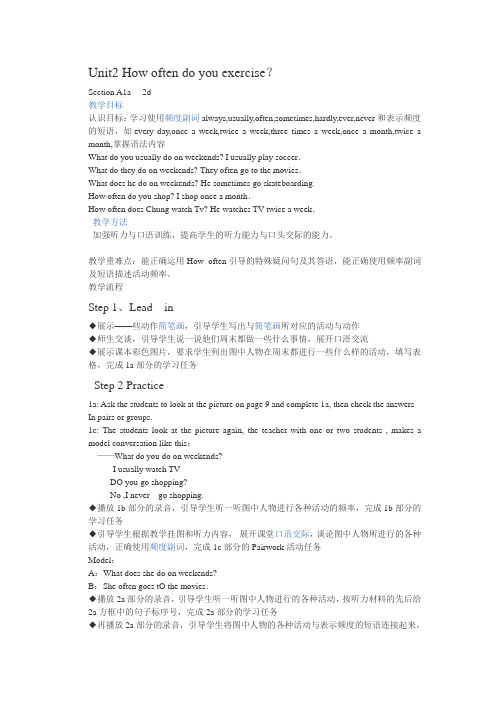
Unit2 How often do you exercise?Section A1a----2d教学目标认识目标:学习使用频度副词always,usually,often,sometimes,hardly,ever,never和表示频度的短语,如every day,once a week,twice a week,three times a week,once a month,twice a month,掌握语法内容What do you usually do on weekends? I usually play soccer.What do they do on weekends? They often go to the movies.What does he do on weekends? He sometimes go skateboarding.How often do you shop? I shop once a month.How often does Chung watch Tv? He watches TV twice a week.教学方法加强听力与口语训练,提高学生的听力能力与口头交际的能力。
教学重难点:能正确运用How often引导的特殊疑问句及其答语,能正确使用频率副词及短语描述活动频率。
教学流程Step 1、Lead in◆展示——些动作简笔画,引导学生写出与简笔画所对应的活动与动作◆师生交谈,引导学生说一说他们周末都做一些什么事情,展开口浯交流◆展示课本彩色图片,要求学生列出图中人物在周末都进行一些什么样的活动,填写表格,完成1a部分的学习任务Step 2 Practice1a: Ask the students to look at the picture on page 9 and complete 1a, then check the answers In pairs or groups.1c: The students look at the picture again, the teacher with one or two students , makes a model conversation like this;——What do you do on weekends?_____-I usually watch TV_____DO you go shopping?_____No ,I never go shopping.◆播放1b部分的录音,引导学生听一听图中人物进行各种活动的频率,完成1b部分的学习任务◆引导学生根据教学挂图和听力内容,展开课堂口语交际,谈论图中人物所进行的各种活动,正确使用频度副词,完成1c部分的Pairwork活动任务Model:A:What does she do on weekends?B:She often goes tO the movies.◆播放2a部分的录音,引导学生听一听图中人物进行的各种活动,按听力材料的先后给2a方框中的句子标序号,完成2a部分的学习任务◆再播放2a部分的录音,引导学生将图中人物的各种活动与表示频度的短语连接起来,完成2b部分的学习任务◆引导学生展开课堂口语交流,谈论自己周末的课外活动.完成2c部分的表格,并分小组进行Pairwork口语交际,注意参照运用GrammarFocus内容,完成2c部分的学习任务Mlodel:A:How often dO you watch TV?B:I watch TV every day.A:What'S your favorite program?B:It's Animal World.A:How often do you watch it?B:...引导学生完成阅读练习:阅读杂志上的“Activity Survey”,参照“V ocabulary Key”内容,运用运用all、most、some、no完成短文WhatDoStudentsDoatGreenHiShSchool?,完成第3部分的学习任务◆引导学生展开Groupwork活动:分小组活动,分析如何才能学好英语,展开调查活动,完成第4部分的表格内容Step3、思维探胜◆频度副词always,usually,often,sometimes,hardlyever,never:频度副词词义频率英文释义近义词always 总是100%all the time constantlyusually 通常80%often,generally frequentlyoften 经常60%(at)manytimes generallysometimes 有时40%at times,now and then occasionallyhardly ever 几乎不20%almost not,not at all seldomnever 从不0%not ever,not at any time rarely◆对比How long、How far、How many、How much、How often、How soon:疑问词词义使用范围how long 多长时间提问一段时间多长提问长度how far 多远提问距离how many 多少提问可数名词的数量how much 多少提问不可数名词的量、提问价钱或提问重量how often 多久一次提问表示频度副词或表示频度的短语how soon 多久以后提问表示将来时态的时间,多由in引出的一段时间短语例1:At the age of five,Martin weiShed 25 kilos.______ _______did Martin weigh at the age of five?析:How much。
人教版新目标八年级上第一单元知识点讲解及练习
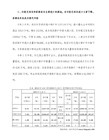
Unit 1 Where did you go on vacation?语言功能:谈论过去的事件重点词汇:try, wonder, dislike, wonderful, bored, were,was, stayed,visited,arrived, went, bought, ate, saw, felt,walk,discuss,expensive,cheap, interesting, boring, exciting, terrible, friendly,special, delicious, rainy,sunny, hot, wet, go on vacation, stay at home,decide to do sth. quite a few.重点短语:quite a few 相当多,不少stay at home 呆在家of course 当然go shopping去购物feel like 给…的感觉,感受到seem to be 好像because of 因为decide to do sth.决定做某事go on vacation去度假ride bicycles骑自行车go to summer camp 去夏令营enough money足够的钱study for tests为考试学习the top of the hill 山顶重点句型:Where did you go on vacation? We went to New York.Did you go to Central Park? Yes,I did.How was the weather? It was sunny.语言结构:一般过去时:肯定句:谓语动词用过去式否定句:助动词did not+动词原形(did not可缩写为didn’t’)疑问句:助动词did+主语+动词原形语法1.不定代词,不指明代替任何特定名词或形容词的代词,常用不定代词有:something某事,somebody某人,someone某人,anything/某事,任何事,anybody某人/任何人,anyone某人/任何人,nothing没有东西,nobody没有人,no one没有人,everything每一件事,everybody每人,everyone每人。
【人教版】新目标八年级英语上册:Unit 3 单元教学设计(1)

【人教版】新目标八年级英语上册:Unit 3 单元教学设计(1)一. 教材分析人教版新目标八年级英语上册Unit 3的主题是“What’s the matter?”,主要讨论日常生活中的身体不适和情感问题。
通过本单元的学习,学生将能够掌握关于身体部位、症状和情感状态的词汇,学会询问和描述他人的身体状况和情感问题。
教材包括词汇表、对话、阅读理解和语法讲解等部分,内容丰富,贴近生活,有助于提高学生的学习兴趣和积极性。
二. 学情分析八年级的学生已经掌握了基本的英语语法和词汇,具备一定的听说读写能力。
但是,学生在实际运用英语进行交流时,还存在一定的困难,特别是在描述自己的身体状况和情感问题时。
因此,教师需要关注学生的实际需求,通过生动有趣的教学活动,激发学生的学习兴趣,帮助他们提高语言运用能力。
三. 教学目标1.知识目标:学生能够掌握关于身体部位、症状和情感状态的词汇,了解日常生活中的身体不适和情感问题的表达方式。
2.能力目标:学生能够用英语询问和描述他人的身体状况和情感问题,提高口语表达能力。
3.情感目标:学生能够关心他人的身体健康和情感需求,培养良好的情感态度。
四. 教学重难点1.重点:学生掌握关于身体部位、症状和情感状态的词汇,能够用英语询问和描述他人的身体状况和情感问题。
2.难点:学生能够正确运用所学词汇和句型,在实际情境中进行流畅的口语表达。
五. 教学方法1.任务型教学法:通过设定各种真实情境的任务,引导学生运用所学知识进行交流,提高学生的语言运用能力。
2.情境教学法:通过生动有趣的情境模拟,激发学生的学习兴趣,帮助他们更好地理解和学习新知识。
3.合作学习法:鼓励学生之间进行小组讨论和互动,培养学生的团队协作能力和人际交往能力。
六. 教学准备1.教师准备教案、课件和教学素材。
2.学生准备课本、笔记本和文具。
3.教学场所:教室。
七. 教学过程1.导入(5分钟)教师通过与学生谈论日常生活中的身体不适和情感问题,引起学生的兴趣,为新课的学习营造轻松愉快的学习氛围。
【人教版新目标】英语八年级上册Unit3单元教案
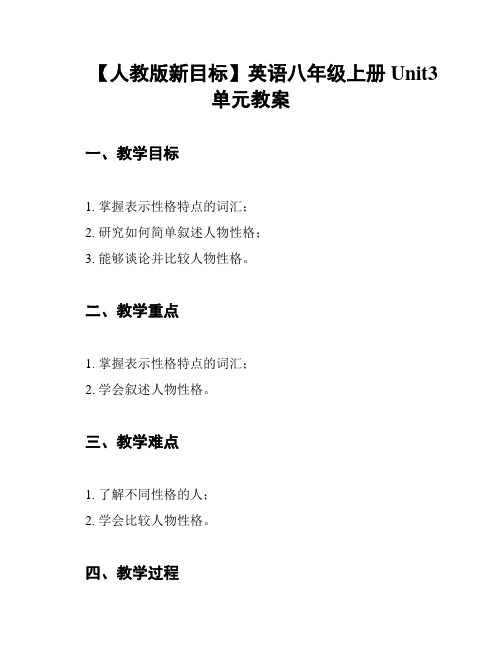
【人教版新目标】英语八年级上册Unit3单元教案一、教学目标1. 掌握表示性格特点的词汇;2. 研究如何简单叙述人物性格;3. 能够谈论并比较人物性格。
二、教学重点1. 掌握表示性格特点的词汇;2. 学会叙述人物性格。
三、教学难点1. 了解不同性格的人;2. 学会比较人物性格。
四、教学过程1. 导入新课:通过展示一组人物图片,鼓励学生来描述人物的性格特点。
2. 研究新知:让学生听录音,学生听完后,让他们试图按照录音说出其中的内容。
然后再让他们分组讨论和总结出几个常用的性格词汇。
3. 练:让学生两人合作,通过比较两个人的性格来进行对话。
老师可以设定一些场景,让学生进行角色扮演。
4. 家庭作业:让学生编写一篇短文,介绍自己的性格特点,并简单描述自己和至少一位朋友的共同之处和区别。
五、板书设计Lesson 1 PersonalitiesUseful words* outgoing* shy* confident* easygoing* honest* creativeTarget languageWhat's he/she like? He/She is...六、教学反思本课通过多种方式来帮助学生掌握表示性格特点的词汇,学会叙述和比较人物性格。
由于学生们年龄较小,因此在讨论性格的过程中,老师需要引导学生正确和客观的表述。
同时通过引导学生进行小组讨论,让学生们在不同的角度去理解人物性格,对于提高学生的思维能力也有一定的帮助。
总的来说,本课教学收到了很好的效果。
人教新目标英语八年级上册unit1-Unit4单元重点知识复习
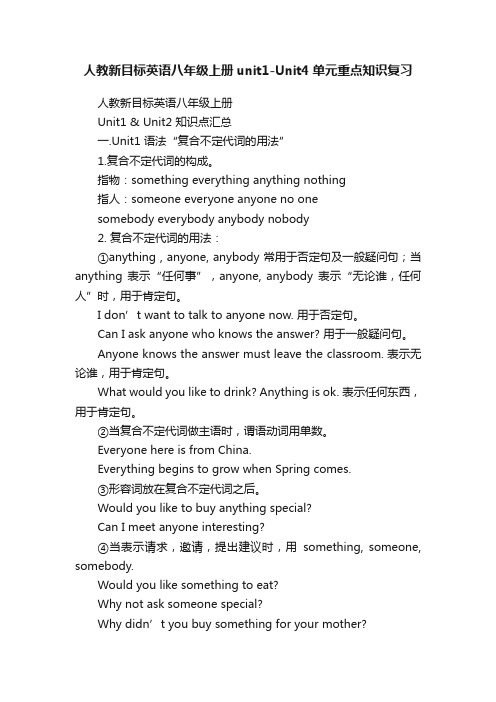
人教新目标英语八年级上册unit1-Unit4单元重点知识复习人教新目标英语八年级上册Unit1 & Unit2 知识点汇总一.Unit1 语法“复合不定代词的用法”1.复合不定代词的构成。
指物:something everything anything nothing指人:someone everyone anyone no onesomebody everybody anybody nobody2. 复合不定代词的用法:①anything , anyone, anybody 常用于否定句及一般疑问句;当anything 表示“任何事”,anyone, anybody 表示“无论谁,任何人”时,用于肯定句。
I don’t want to talk to anyone now. 用于否定句。
Can I ask anyone who knows the answer? 用于一般疑问句。
Anyone knows the answer must leave the classroom. 表示无论谁,用于肯定句。
What would you like to drink? Anything is ok. 表示任何东西,用于肯定句。
②当复合不定代词做主语时,谓语动词用单数。
Everyone here is from China.Everything begins to grow when Spring comes.③形容词放在复合不定代词之后。
Would you like to buy anything special?Can I meet anyone interesting?④当表示请求,邀请,提出建议时,用something, someone, somebody.Would you like something to eat?Why not ask someone special?Why didn’t you buy something for your mother?Unit2 语法“频率副词”How often 常用于对频率的提问,意为“多长时间一次”,其答语可以是once/ twice / three times a week; always/ usually/ often/ sometimes/ hardly ever/ never 等表示时间频率的副词及短语。
【人教版】新目标八年级英语上册:Unit1单元教学设计

【人教版】新目标八年级英语上册:Unit1单元教学设计一. 教材分析人教版新目标八年级英语上册Unit1 “How do you get to school?” 主要介绍了学生上下学的交通方式以及询问和回答日常交通方式的能力。
本单元关键词有:transportation, way, go to school, by bus, on foot等。
主要句型为:How do you go to school? I go to school by bus.二. 学情分析八年级的学生已经掌握了基本的英语语法和单词,具备一定的听说读写能力。
但对于一些交通方式的专业词汇和表达可能还不够熟悉。
因此,在教学过程中需要引导学生通过情境交际来掌握和运用本节课的词汇和句型。
三. 教学目标1.知识目标:学生能够掌握与交通方式相关的词汇和表达,如transportation, way, go to school, by bus, on foot等;学生能够运用主要句型How do you go to school?进行日常询问和回答。
2.能力目标:学生能够在真实情境中运用本节课所学词汇和句型进行交流。
3.情感目标:培养学生热爱生活,关注环境保护的意识。
四. 教学重难点1.重点:学生能够熟练掌握本节课的词汇和句型,并在实际情境中进行运用。
2.难点:学生能够正确运用主要句型How do you go to school?进行日常询问和回答。
五. 教学方法1.情境教学法:通过设置各种真实情境,让学生在实际交流中掌握和运用本节课的词汇和句型。
2.交际法:引导学生进行生生、师生之间的互动交流,提高学生的口语表达能力。
3.任务型教学法:通过完成各种任务,让学生在实践中运用所学知识。
六. 教学准备1.教学课件:制作包含本节课关键词、句型的课件。
2.教学道具:准备各种交通方式的图片或实物,如自行车、公交车、地铁等。
3.练习题:准备一些练习题,用于巩固所学知识。
【人教版】新目标八年级英语上册:Unit8单元教学设计
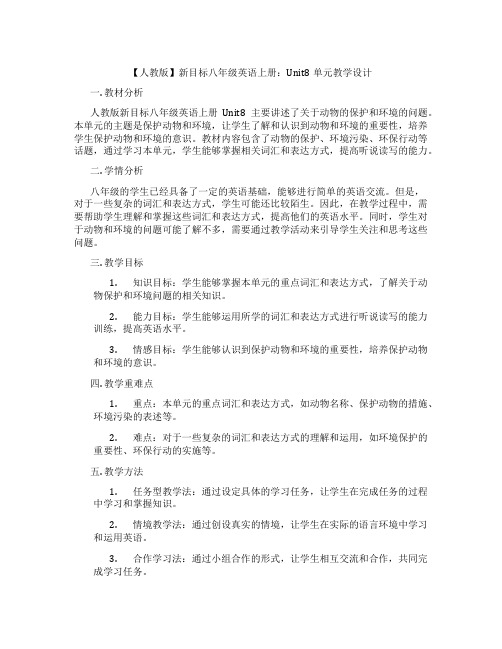
【人教版】新目标八年级英语上册:Unit8单元教学设计一. 教材分析人教版新目标八年级英语上册Unit8主要讲述了关于动物的保护和环境的问题。
本单元的主题是保护动物和环境,让学生了解和认识到动物和环境的重要性,培养学生保护动物和环境的意识。
教材内容包含了动物的保护、环境污染、环保行动等话题,通过学习本单元,学生能够掌握相关词汇和表达方式,提高听说读写的能力。
二. 学情分析八年级的学生已经具备了一定的英语基础,能够进行简单的英语交流。
但是,对于一些复杂的词汇和表达方式,学生可能还比较陌生。
因此,在教学过程中,需要帮助学生理解和掌握这些词汇和表达方式,提高他们的英语水平。
同时,学生对于动物和环境的问题可能了解不多,需要通过教学活动来引导学生关注和思考这些问题。
三. 教学目标1.知识目标:学生能够掌握本单元的重点词汇和表达方式,了解关于动物保护和环境问题的相关知识。
2.能力目标:学生能够运用所学的词汇和表达方式进行听说读写的能力训练,提高英语水平。
3.情感目标:学生能够认识到保护动物和环境的重要性,培养保护动物和环境的意识。
四. 教学重难点1.重点:本单元的重点词汇和表达方式,如动物名称、保护动物的措施、环境污染的表述等。
2.难点:对于一些复杂的词汇和表达方式的理解和运用,如环境保护的重要性、环保行动的实施等。
五. 教学方法1.任务型教学法:通过设定具体的学习任务,让学生在完成任务的过程中学习和掌握知识。
2.情境教学法:通过创设真实的情境,让学生在实际的语言环境中学习和运用英语。
3.合作学习法:通过小组合作的形式,让学生相互交流和合作,共同完成学习任务。
六. 教学准备1.教材:人教版新目标八年级英语上册。
2.多媒体设备:电脑、投影仪、音响等。
3.教学素材:相关动物和环境的图片、视频等。
七. 教学过程1.导入(5分钟)通过展示一些动物和环境的图片,引导学生关注和思考动物和环境的问题。
提问学生对于动物和环境的了解和看法,激发学生的学习兴趣。
【人教版】新目标八年级英语上册:Unit 7 单元教学设计
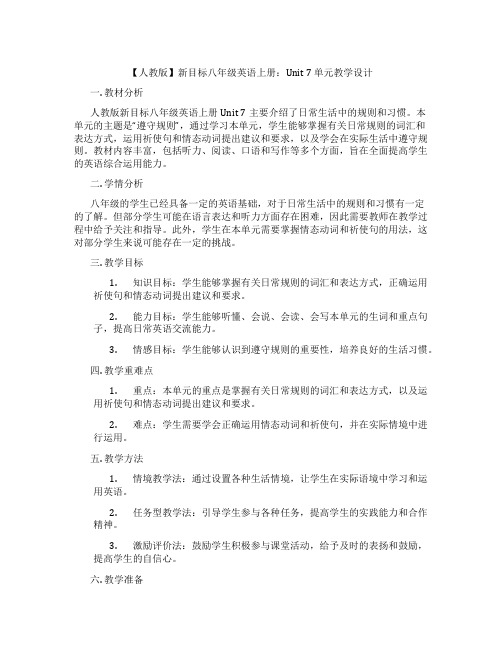
【人教版】新目标八年级英语上册:Unit 7 单元教学设计一. 教材分析人教版新目标八年级英语上册Unit 7主要介绍了日常生活中的规则和习惯。
本单元的主题是“遵守规则”,通过学习本单元,学生能够掌握有关日常规则的词汇和表达方式,运用祈使句和情态动词提出建议和要求,以及学会在实际生活中遵守规则。
教材内容丰富,包括听力、阅读、口语和写作等多个方面,旨在全面提高学生的英语综合运用能力。
二. 学情分析八年级的学生已经具备一定的英语基础,对于日常生活中的规则和习惯有一定的了解。
但部分学生可能在语言表达和听力方面存在困难,因此需要教师在教学过程中给予关注和指导。
此外,学生在本单元需要掌握情态动词和祈使句的用法,这对部分学生来说可能存在一定的挑战。
三. 教学目标1.知识目标:学生能够掌握有关日常规则的词汇和表达方式,正确运用祈使句和情态动词提出建议和要求。
2.能力目标:学生能够听懂、会说、会读、会写本单元的生词和重点句子,提高日常英语交流能力。
3.情感目标:学生能够认识到遵守规则的重要性,培养良好的生活习惯。
四. 教学重难点1.重点:本单元的重点是掌握有关日常规则的词汇和表达方式,以及运用祈使句和情态动词提出建议和要求。
2.难点:学生需要学会正确运用情态动词和祈使句,并在实际情境中进行运用。
五. 教学方法1.情境教学法:通过设置各种生活情境,让学生在实际语境中学习和运用英语。
2.任务型教学法:引导学生参与各种任务,提高学生的实践能力和合作精神。
3.激励评价法:鼓励学生积极参与课堂活动,给予及时的表扬和鼓励,提高学生的自信心。
六. 教学准备1.教师准备:备好本单元的教学课件、教案、听力材料等。
2.学生准备:预习本单元的生词和句子,做好上课的准备。
七. 教学过程1.导入(5分钟)教师通过提问方式引导学生谈论日常生活中遵守规则的重要性,激发学生的学习兴趣。
2.呈现(10分钟)教师展示本节课的主要内容,包括生词、短语和句子,让学生初步感知和理解。
- 1、下载文档前请自行甄别文档内容的完整性,平台不提供额外的编辑、内容补充、找答案等附加服务。
- 2、"仅部分预览"的文档,不可在线预览部分如存在完整性等问题,可反馈申请退款(可完整预览的文档不适用该条件!)。
- 3、如文档侵犯您的权益,请联系客服反馈,我们会尽快为您处理(人工客服工作时间:9:00-18:30)。
(此文档为word格式,下载后您可任意编辑修改!)新目标英语八年级上Go for it!教案Unit 1 How often do you exercise一.单元教材分析:本单元以―How often do you exercise ?‖为话题展开教学活动。
学会恰当地使用频率副词及短语,学会描述课余时间的活动安排和基本饮食结构。
通过复习七年级学习过的动词短语,及本单元的听力练习,口语交际活动和写作练习,使学生积极参与,合作,从而培养学生的综合语言运用能力。
教材在本单元的开篇,安排了关于谈论课余时间的各项活动,以及初步认识和使用频率副词,为进一步地使用频率副词及动词短语做语言知识上的准备。
二.课程目标:1.语言目标(1)恰当使用always usually often sometimes weekends? I often go to the movies.How often does she go to the movies? She goes to the movies oncea week .2.能力目标学习谈论自己、朋友或他人平时的活动及频率,描述课余时间的活动安排,初步培养学生的语言综合运用能力。
三.情感态度和价值观引导学生关注自己以及身边的人对于日常生活的安排,养成合理安排生活起居及饮食好习惯。
倡导健康生活,健康起居。
培养学生的逻辑表述能力,激发学生的积极思维,并使学生互相了解,增进友谊,加强人际交往,形成良好的人际关系。
四.单元教学重难点1.短语as for 至于junk food 垃圾食品eating weekends 在周末start with 以……开始every day 每天three times a week 一周三次 a lot of 很多surf the Internet 网上冲浪try to do sth 尽量去做某事make a difference 使得结果不同go to the movies 看电影in good weekends? I usually play soccer.How often do you shop? I shop once a month.How often does Chung watch TV? He watches TV twice a week.六.课时安排 4 课时Section A一.教学内容Section A(教材P1-3)二.教学目标A:知识目标:恰当使用always usually often sometimes weekends? I often go to the movies.What does she do on weekends ?She often goes to the movies.B:能力目标:学习描述课余时间的活动安排,初步培养学生的语言综合运用能力。
三.情感态度价值观培养学生的逻辑表述能力,激发学生的积极思维,并使学生互相了解,增进友谊,加强人际交往,以形成良好的人际关系。
四.教学重、难点及教学突破使学生学会询问物品的主人的基本句型,体会一般疑问句的用法,尤其是动词三人称单数的用法;巩固所学单词的拼写。
五.教学准备教师准备la部分的挂图学生准备复习所学物品的单词,体会一般疑问句的用法,巩固所学单词的拼写;掌握Using contest guessing和Role playing的学习策略。
六.教学策略:复习旧句型―What do you usually do on weekends ? ‖,引出了七年级曾学过的频率副词usually和一些动词短语,减轻新课的难度;一般现在时态的三单形式,是学生学英语易错的问题。
八.课后反思九.配套练习(一)句型转换。
1. He often gets up at five every day. (变为否定句)2. She visits go to the movies on the bus. (提问)4. She you dance? (肯定回答)7. Are you a student? (否定回答)8. Dick is watching TV now. (用sometimes改写)9. I study in Beijing. (将I变为he)10.I‘m not , Rose.2.I‘m sorry I can‘t spell the ______ (nine) word.3.My parent sometimes ________(not ‘t talk with this village?7.If you are kind of ______ ( B一.教学内容Section B(教材P4-6)二.教学目标A:知识目标:恰当使用always usually often sometimes do you exercise?Is Bill healthyunhealthy?B:能力目标:描述,评价自己及他人的饮食习惯,初步培养学生的语言综合运用能力三.情感态度价值观引导学生关注自己以及身边的人对于日常生活的安排,养成合理安排生活起居及饮食好习惯。
倡导健康生活,健康起居四.教学重、难点重点:能够听、说、读、写自己、朋友或他人平时的活动,生活习惯并在实际情景中运用自如。
难点:第三人称单数谓语动词在核心句型中的运用五.教学准备:一些食品图片六.教学过程:八.配套练习(一)用动词的适当形式填空。
1.My cousin often _____(do) the evening.2.They ______ (not do) some reading these days.3.The students of Class Three ______ ( English lesson now.4.One of the students ______ ( drink ) cola in class.5. My sister wants _________ (see ) you this afternoon.6. _______ (be) there any sheep on the farm ?3.7. Lily and work it out.a.The man left ‘tYou should drink some tea. I2.能力目标学习如何运用所学目标句型询问和了解他人的身体情况并给予适当建议。
三.情感态度和价值观通过本单元的学习能引导学生关注自己及身边人的身体健康、并学习如何去关心他人及提出适当的建议。
能使学生意识到要如何去保持健康并养成良好的生活习惯,认识中国传统中医理论。
四.单元教学重难点(一)短语1. in one‘s and rest 躺下休息I found a wallet lying on the ground.3.see a dentist 看牙医4.‘t (表示劝告或推荐)He should stop smoking. You shouldn‘t leave a baby alone in the and yang 阴阳平衡 a balance of… …的平衡9. too much 太多much too10. at the moment 此刻, 现在11.get tired 疲劳12. be stressed out 紧张13.stay the other ‘t eat anything. 他不应该吃东西。
3. I feel very well.我觉得很好。
I‘m not feeling well.我感觉身体不舒服。
I . 我希望你快点好起来。
It‘s easy to ‘t think I‘m improving. 我想我没有提高That sounds like a good idea. 那听起来像是一个好主意。
That‘s a good idea. 那是个好主意六.课时安排 4 课时Section A一.教学内容Section A(教材P7-9)二.教学目标A:知识目标:掌握身体各部位的表达方法,询问和表达身体的不适.‘tYou should drink some tea. I .B.能力目标学习如何运用所学目标句型询问和了解他人的身体情况并给予适当建议三.情感态度价值观引导学生关注自己及身边人的身体健康、并学习如何去关心他人。
四.教学重、难点。
重点:身体各部位的表达方法,询问和表达身体的不适.What‘s the matter? What‘s wrong with you?I have a toothache headache stomachache backachesore throat.九.配套练习(一)单选1. -________ , Judy ? - I D. good for4. We should not eat ________ junk food.A. too manyB. too muchC. many tooD. much too5. -How is the young man? -________A. He is twelve.B. He's much better.C. He is a doctor.D. He's Allan.6. It's important to eat a ________ diet.A. balancedB. balanceC. balancingD. balances7. He often example B. For example C. For the example D. For a example8. You should not eat________24 B. nothing for C. anything for D. everything at9. -My mother is ill. -________A. Don't worry.B. No D. work(二)完成对话。
A: We are going to play basketball. ___(1)_____B: I'd like to, but I can't.B: I the B一.教学内容Section B(教材P10-12)二.教学目标知识目标:What‘s the matter with John?He ‘t go to the party.能力目标:较好掌握询问和身体不适的表达方法,较熟练运用所学目标句型询问和了解他人的身体情况,给予适当建议。
三.情感态度好身体是一切的根本,每一个人都应重视自己和家人的身体健康。
